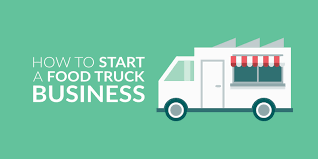
In recent years, the food truck industry has been on the rise, offering a unique and exciting opportunity for culinary enthusiasts to turn their passion for food into a profitable business.How to Start a food truck business. If you’ve ever dreamed of hitting the road with your own mobile kitchen, here’s a comprehensive guide on how to start a food truck business.
1. Concept and Menu Development: The first step in launching your food truck venture is to define your concept and develop a mouthwatering menu. Consider your target audience, your culinary strengths, and the market demand in your area. Your menu should be distinctive, offering something that sets you apart from the competition.
2. Market Research: Conduct thorough market research to identify your potential customers and competition. Scout locations where your target audience frequents, and assess the demand for your cuisine. Analyze your competitors to identify gaps in the market that your food truck can fill.

3. Business Plan: Create a detailed business plan that outlines your concept, budget, financial projections, and marketing strategy. A well-structured plan will not only guide your business but also help you secure financing if needed.
4. Legalities and Permits: Ensure you comply with all legal requirements and obtain the necessary permits and licenses. These may include health permits, food handler certifications, business licenses, and parking permits. Check with local authorities and health departments to understand the specific regulations in your area.
5. Find the Right Truck: Invest in a food truck that suits your needs and budget. You can choose between purchasing a new or used truck or even converting a vehicle into a food truck. Make sure it’s equipped with all the necessary kitchen appliances and meets health and safety standards.
6. Kitchen Setup: Design an efficient kitchen layout that maximizes space and workflow. Invest in high-quality kitchen equipment and appliances, ensuring they are properly installed and maintained to meet health codes.

7. Branding and Marketing: Create a memorable brand identity, including a catchy name, logo, and branding materials. Establish an online presence through a website and active social media profiles. Utilize digital marketing and engage with potential customers through content and promotions.
8. Location Strategy: Choosing the right location is critical to your food truck’s success. Experiment with different spots to find the ones with the highest foot traffic and customer demand. Consider events, festivals, office parks, and popular street corners as potential locations.
9. Pricing Strategy: Set competitive yet profitable pricing for your menu items. Consider factors such as ingredient costs, labor, and overhead expenses when determining your pricing strategy. Monitor customer feedback and adjust your prices if necessary.
10. Quality and Consistency: Consistency in food quality and service is key to building a loyal customer base. Train your staff to maintain high standards, and regularly inspect the cleanliness and functionality of your truck.
Conclusion
Starting a food truck business is a thrilling journey filled with opportunities for culinary creativity and entrepreneurship. With careful planning, dedication, and a commitment to delivering delicious food, your food truck can become a beloved fixture in your community and a profitable venture. So, get ready to hit the road and embark on your culinary adventure!

